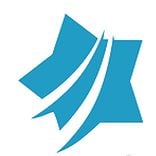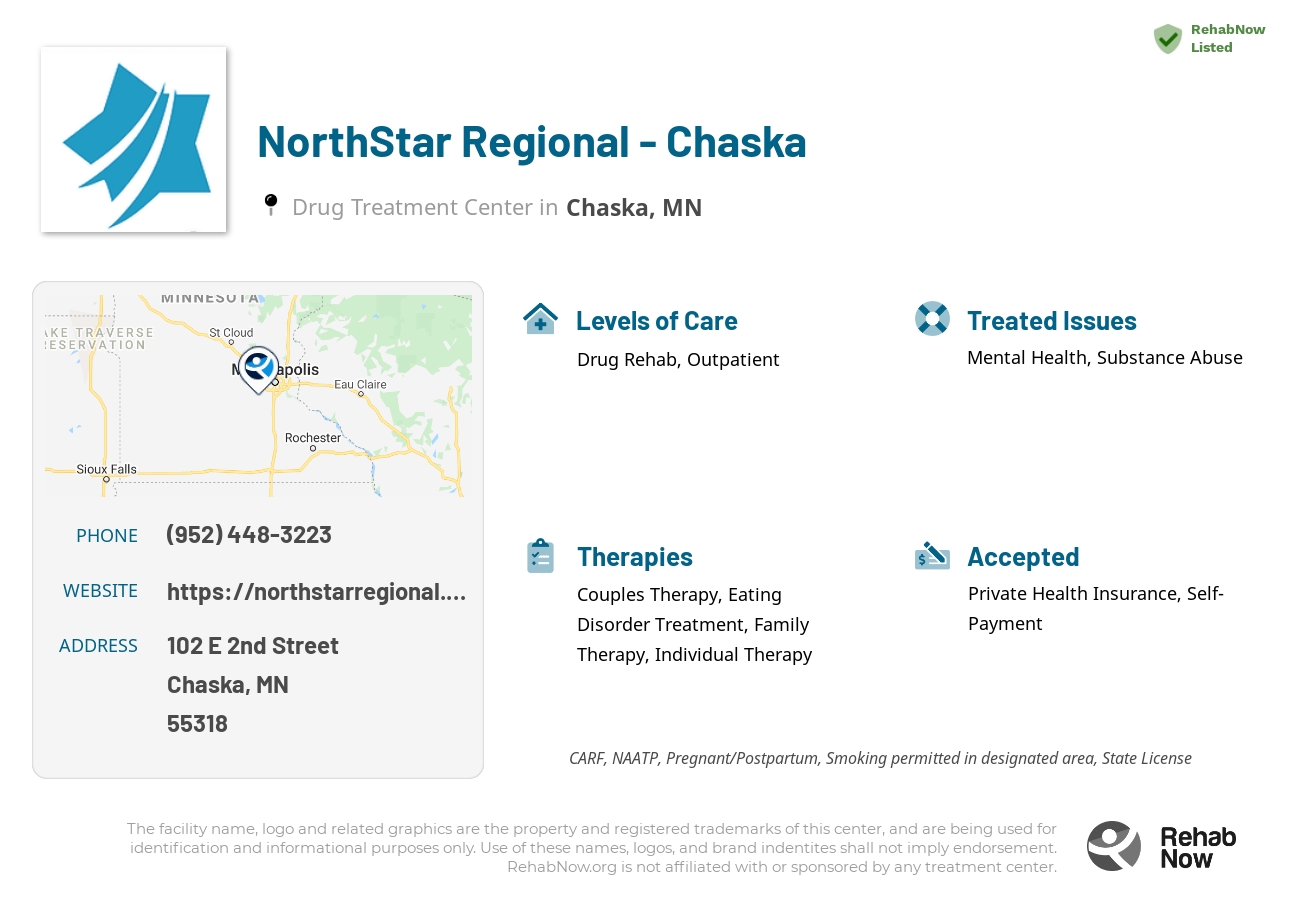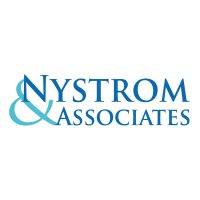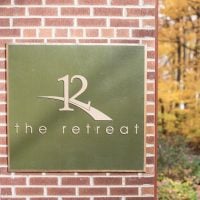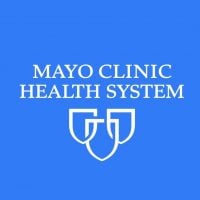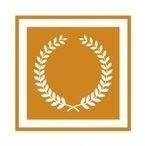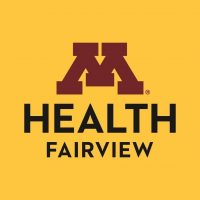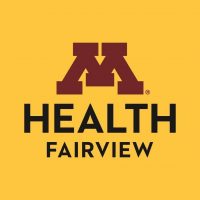NorthStar Regional - Chaska
Drug Rehab Center in Chaska, Minnesota
NorthStar Regional - Chaska offers personalized, evidence-based care for those struggling with addiction, including comprehensive detoxification services, medication to reduce symptoms of withdrawal and cravings, therapy sessions, relapse prevention classes, 12 Step work groups and recreational activities with an aftercare support system to help ensure successful recovery.
About This Minnesota Facility
NorthStar Regional - Chaska in Chaska, Minnesota is a treatment facility that specializes in helping individuals recover from a variety of substance abuse disorders and mental health issues. They offer a range of treatment programs tailored to meet the specific needs of each patient, including drug rehab, outpatient services, partial-hospitalization, and aftercare support levels of care. NorthStar Regional - Chaska accepts private health insurance and is committed to providing effective and compassionate care to those seeking to overcome addiction and improve their overall well-being.
NorthStar Regional - Chaska provides a comprehensive approach to addiction and substance abuse treatment. Through their various programs, they offer a range of services designed to address the unique challenges that individuals face in their recovery journey. With a focus on evidence-based treatment methods, they provide therapy and counseling, medication management, group support, and education to equip individuals with the necessary tools to achieve long-term sobriety. Their dedicated team of professionals is committed to tailoring treatment plans to individual needs, providing a supportive and nurturing environment for healing and recovery.
Genders
Ages
Modality
Additional
Conditions and Issues Treated
A drug abuser needs help because if no one helps them, they will not leave their vicious circle.
People who abuse drugs are likely to suffer from an addiction, which can cause serious health problems. It can also cause quarrels with people around them. It is common for drug abusers to have difficulty holding down jobs or relationships, but sometimes people around them can be quite tolerant. There are cases where the families of the drug abusers do not want to see them get any help, and the subject becomes controversial.
When it comes to helping drug abusers get sober, there are many options to choose from. It is essential to state that there is no “correct” way of doing things. People are different, and they need different types of help to get over their addiction.
Opioid addiction treatment should be done in a medically supervised drug rehab. Opioid addiction treatment will include detoxification and drug rehab counseling to help both the user and their loved ones learn how to live a successful sober lifestyle. Methadone, buprenorphine, and naltrexone are three medications that can help treat opioid addiction. Individual drug rehab counseling sessions can be helpful to discuss any questions or concerns with the drug treatment program.
Levels of Care Offered at NorthStar Regional - Chaska
This center offers a variety of custom treatment tailored to individual recovery. Currently available are Aftercare Support, Drug Rehab, Outpatient, Partial-Hospitalization, with additional therapies available as listed below.
Individuals struggling with drug addictions can get help from several treatment options, including inpatient and outpatient programs. Outpatient drug treatment programs can also provide patients with different levels of care, usually depending on the patient’s degree of addiction.
At an outpatient program in Chaska, a patient will attend a recovery program during the day and return home in the evening. Suppose a patient is struggling with drug addiction. In that case, an outpatient program can serve as an effective transition point during the recovery process.
Partial Hospitalization Program is when a person in rehab takes part in regular treatment sessions, at least five days per week (and sometimes six), during all or most hours of the day, at NorthStar Regional - Chaska. These programs vary in length, but they can last anywhere from one month to three months—or longer.
This is done through the use of a method called “therapeutic community.” PHPs are very intense, and they are best for individuals who have completed a successful, medically supervised withdrawal.
Aftercare is a part of drug rehabilitation. It is also known as “post-treatment support.” Aftercare programs are available for addicts after they complete drug rehab. It is often the final step in the recovery process. The goal of aftercare is to ensure that addicts maintain their achievements in rehab and do not relapse. Professionals generally provide aftercare (including addiction therapists, physicians, social workers, psychologists) and involve individual and group therapy sessions.
Therapies & Programs
Individual therapy is a critical component of addiction recovery. It allows the patients to go deep into their core issues and discover how to handle those problems better. Therapy can be conducted in individual sessions as well as group settings. In individual therapy for addiction, the patient meets with their therapist one-on-one to focus on the underlying issues. This allows patients to open up and discuss personal topics they may not feel comfortable discussing in a group setting. This type of therapy can help develop solutions specific to each patient, which helps speed up the recovery process.
Couples therapy is beneficial for couples in which at least one partner has a substance use disorder. This type of therapy can help partners improve communication skills, which is an important factor in a healthy relationship. It can also help partners better understand one another so they have a greater understanding of how the other partner may be feeling.
Benefits of couples therapy include:
- Improvement in communication skills
- Increased understanding of the dynamics within a relationship
- Increased sense of support and trust in the relationship
- Better teamwork between partners/increased willingness to listen and work together
- Enhanced tolerance of each other’s shortcomings
- Improved ability to have open, honest communication with each other
Family therapy is a crucial part of drug treatment and getting sober. It is one of the most effective ways to help addicts stay on the path to long-term sobriety. When a drug addict decides that they want to try and get sober, it takes the support of every person they love to succeed. It can be incredibly difficult for loved ones to watch an addict go through the pain and suffering of withdrawal, but by being there with them and supporting them, they can help to make sure that the addiction never returns.
One of the most important parts of family therapy is the relapse prevention plan. During treatment, therapists and doctors will often sit down with the addict and their family to develop a plan in case the addict ever feels like they want to use again. This plan should involve steps the addict and family can take together to prevent them from relapsing in the future. An addict’s family can play a vital part in helping them to avoid relapse because they can spot the warning signs and help them get back on track before it becomes too much of a problem.
Group therapy helps prevent addicts from feeling isolated or unique in their situation by offering a sense of comfort and fellowship. It also creates a forum for addicts to build their support systems and learn from each other. The group therapy sessions at NorthStar Regional - Chaska occur in a group setting rather than one-on-one to create a safer, controlled environment where addicts feel comfortable.
Trauma therapy helps people dealing with addiction by allowing them to confront the traumas of their past and move past them. It is important to note that trauma therapy should not be confused with PTSD (post-traumatic stress disorder) Rather, it is used to treat the effects of trauma, which are often at the root of addiction.
Cognitive Behavioral Therapy (CBT) is a common therapeutic approach to help drug addicts. It teaches addicts new ways of thinking and behaving so that they can avoid relapse. There are several forms of CBT used in drug rehabilitation centers.
Cognitive Restructuring helps addicts identify faulty, negative thinking so that they can work together with the therapist to find healthier ways of thinking, resulting in better decision-making.
Cognitive Behavioral Therapy for Addiction uses the principles of CBT to help treat addiction. It focuses on specific aspects of each person’s thinking, feeling, physiology, and behavior. It aims to identify specific problems in these areas and create a personalized treatment strategy.
Rational Emotional Behavior Therapy aims to help you understand your emotions and how they affect your behaviors and addiction. It breaks down the addiction and behaviors behind it. Those who complete the program will identify their feelings and reactions and positively change their behaviors.
Entering a 12-step program allows people to accept that they struggle with an addiction on their own terms. It breaks down the process into 12 steps and gives recovering patients the ability to self help themselves without feeling rushed.
In Alcoholics Anonymous, members follow “The Big Book,” which contains guidelines for sobriety and offers support from fellow participants who have been through similar struggles. Many drug users also turn to Narcotics Anonymous or Pills Anonymous when they are looking at seeking treatment.
Both Narcotics Anonymous and Alcoholics Anonymous have 12 steps in common. They address issues that include ‘admitting there is a problem,’ taking control of the addiction, learning to listen to others without judgment, making amends, and more.
Patient Experience
Creative Arts
Creative arts therapy is an expressive process that helps people heal. Even if the goal isn’t always to create a finished product, it’s therapeutic for many. They can express themselves through journaling or other creative outlets like sketching, painting, sculpting, etc. This helps them cope with stress and anxiety better than before (and even when they were). The activity improves communication skills and the ability to process traumatic events from one’s past, often triggered during periods of withdrawal/relapse.
Experiential Therapy at NorthStar Regional - Chaska
Experiential Therapy is a new approach to addiction treatment. Addiction-related psychological issues like depression and anxiety are addressed through physical activities.
Experiential Therapy can help those who have struggled with past traumas or life decisions like drug use. It allows people to gain new perspectives on their behavior patterns by recreating experiences in healthy ways rather than continuing old habits that may no longer serve them well.
Fitness Therapy
Opting for fitness therapy allows someone to get through their recovery while also rebuilding their body. They can do this by pairing it with nutritional therapy, which will help them feel better and make healthier choices from the start of rehab. This type of physical activity that they provide offers a solid connection between your mind and body, teaching how to create healthy life habits without an addiction involved at all.
Fitness Therapy comes in two types: psychotherapy combined with exercise or just exercise alone, where people learn about nutrition throughout the process. It’s most commonly used in rehabilitation programs offered by NorthStar Regional - Chaska.
Payment Options Accepted
For specific insurance or payment methods please contact us.
Is your insurance accepted?
Ask an expert, call (888) 674-0062
NorthStar Regional Associated Centers
Discover treatment facilities under the same provider.
- NorthStar Regional - Maple Grove in Maple Grove, MN
- NorthStar Regional - Chanhassen in Chanhassen, MN
- NorthStar Regional - Men's Lodging in Chaska, MN
- NorthStar Regional - Stoughton Ave in Chaska, MN
- NorthStar Regional - Hundertmark Rd in Chaska, MN
Learn More About NorthStar Regional Centers
Additional Details
Specifics, location, and helpful extra information.
Chaska, Minnesota 55318 Phone Number(952) 448-3223 Meta DetailsUpdated November 25, 2023
Staff Verified
Patient Reviews
There are no reviews yet. Be the first one to write one.
Chaska, Minnesota Addiction Information
Minnesota is fighting an opioid epidemic that is leaving hundreds of its residents dead each year. Both prescription opioids and illicit opioids are widely abused in the Land of 10,000 Lakes. Heroin continues to be one of the most commonly abused drugs in the state, if not the most common illicit drug. Over 10% of all treatment admissions in Minnesota list heroin as their drug of choice.
Although the drug addiction disorder in Chaska, Minnesota isn't as serious as it is in other places throughout the country, it is still a major problem. According to the National Institute on Drug Abuse, in 2016, there were 9.5 drug overdose deaths per 100,000 people in Chaska. Many rehab centers in Chaska, MN, can offer you the help you need, so it is important to research to find the right one.
Treatment in Nearby Cities
- Maple Grove, MN (21.1 mi.)
- Dodge Center, MN (64.0 mi.)
- Glenwood, MN (105.8 mi.)
- Zimmerman, MN (45.5 mi.)
- Cloquet, MN (144.8 mi.)
Centers near NorthStar Regional - Chaska
The facility name, logo and brand are the property and registered trademarks of NorthStar Regional - Chaska, and are being used for identification and informational purposes only. Use of these names, logos and brands shall not imply endorsement. RehabNow.org is not affiliated with or sponsored by NorthStar Regional - Chaska.
